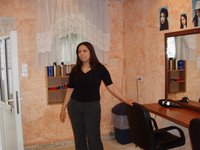Druse custom is to be loyal citizens of the country where they live. The Druse in the Galilee and near Haifa have consistently expressed loyalty to Israel; they have served in the Israeli army both as enlisted men and officers since 1948, and have fought on the Israeli side in all the wars since then. The Golan Druse remain loyal to Syria, though they intermarry with the Israeli Druse.
On our visit to Mrar, a Druse village in the Galilee, we learned how the Druse are taking the initiative to adapt their customs to life in a modern country. Through a community center and job-training programs, they are controlling their own adaptation to contemporary life and the demands of a changing society. Druse are around 58% of the village inhabitants. Muslim and Christian Arabs make up the remainder of the population; surrounding lands include Jewish cooperative farms and kibbutzes. The main occupation of the villagers is agriculture: they produce olives and olive oil.
Now let me tell you about a Druse woman named Nada. At age 23, she became an IDF widow: that is, her husband died fighting for Israel. She had three small sons and no education. Not long afterwards, she asked her father-in-law if she could study in night school. Despite the objections of members of the family, he agreed to accompany her to school so that she could study but still preserve her and the family's reputation. She completed high school 4 years after her husband's death.
After finishing school, she agreed to design a women's program for the community center, which previously had been for men only. When first faced with the task of writing a plan she cried, but she made the plan and she learned. Her first project was grief counselling for a group of 5 widowed friends. In the beginning, malicious gossip forced them to meet in secret. Over time women's participation in center programs and in educational activities has become much more acceptable in the village.
Nada has now been the head of the women's program for 11 years, working with the director of the center, and teaching women in other villages to do similar things. Her life continues to evolve, and her family is much more supportive. In one month she will get a driver's license -- a very big step for a woman in this village. She is buying a car, so she'll have transportation of her own.
Activities for women at the center include a sewing shop with machines where women can make clothes for themselves or their friends, a theater program for deaf girls, a beauty school where women learn to do makeup, manicures, and hair dressing; and an exercise club (open to women in the daytime, men at night). Through the center, village women have also taken a film course, and run successful businesses filming the women's celebrations at traditional Druse weddings.
"I believe in women's power," says Nada. "Anywhere I hear about an opportunity to create a women's program, I run there. I have a full-time job and I'm a full-time volunteer."
Let me also tell you about Adnan, an actor, an author, a founder of two theater programs, and the energetic director of the Mrar Community Center. His theater for the deaf has given performances within and outside the village. They use Hebrew, Arabic, and Israeli sign language, which is the same for both groups. When the program began around 10 years ago, deaf girls were uneducated and were considered unmarriageable: this is changing. Besides his work developing the community center, he has recently acted in the Israeli film "The Syrian Bride."
He says: "People believe in this place. We don't believe that politics can achieve anything: this is built by the inhabitants themselves." He's seeking money from local businesses to expand the programs, the health club, the theater programs (one for the deaf and another for hearing actors), and all the center's functions. The center also sponsored a multi-cultural festival bringing together members of the 4 religions of the area: Druse, Christians, Muslims, and Jews.
Finally, a word about the owner of a just-opened beauty salon. We met her at the community center, and then visited her new place of business, located in the apartment building where her family lives. She has taken both business courses and the beauty program, and now hopes to succeed in her new endeavor. Her father, whom we met at her salon, is completely supportive.

Sponsorship of the job programs is MATI, a much larger job program which receives funding from the Joint Distribution Committee. The beauty school receives funding from the Ann Arbor Jewish community. Center programs also receive funding from the National Insurance Institute.
Note that Mrar is also spelled M'ghar, pronounced more like Mrar.
No comments:
Post a Comment